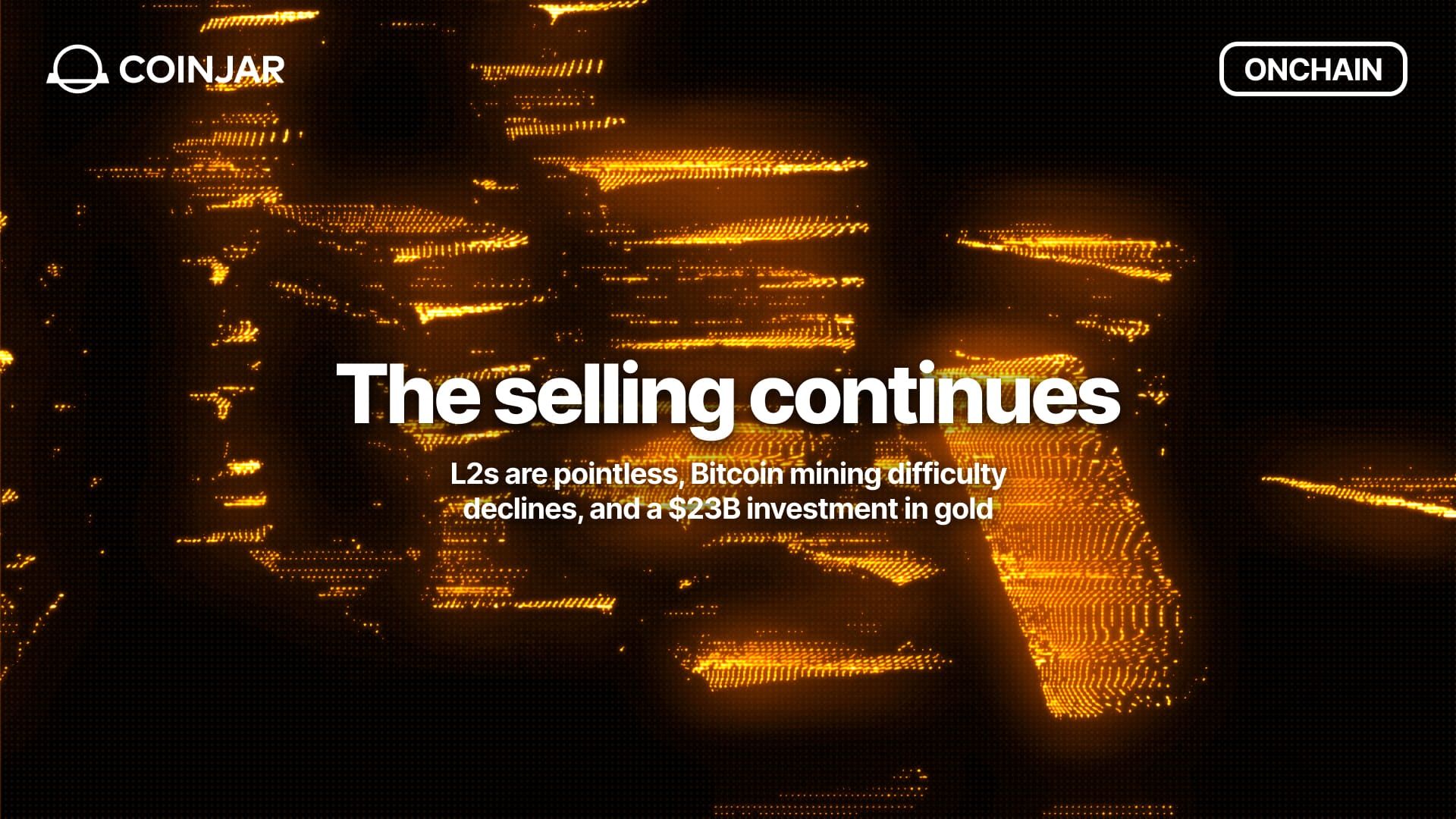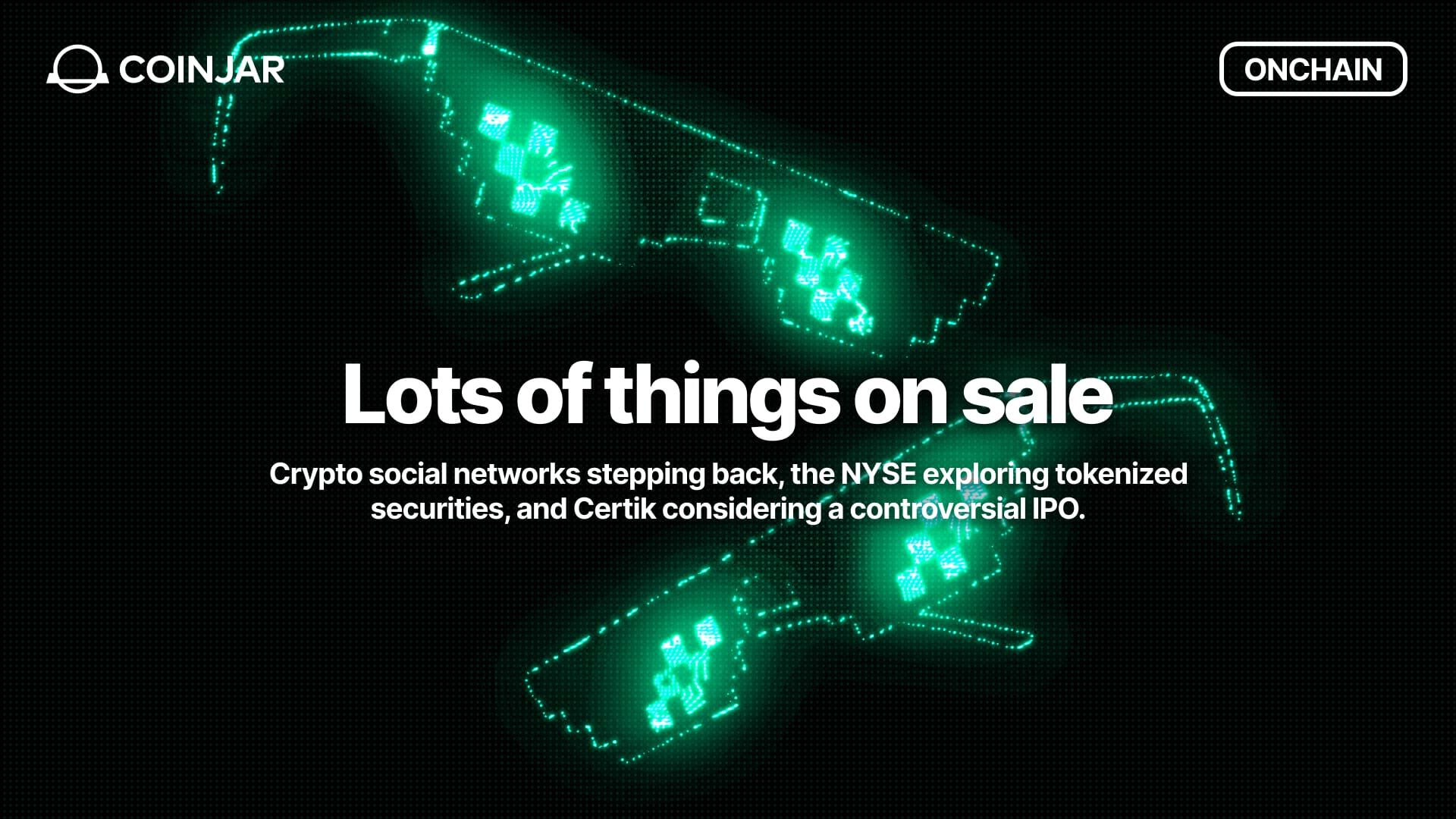Onchain: Blinking Red
July 17, 2024
Share this:

Red has always been used as a warning sign, as we're wired to pay attention to it. The colour is also a theme for what's happened in crypto in the past few days.
Story One
Red Candles
In January of this year, the German criminal police seized nearly 50,000 Bitcoin from the illegal streaming site movie2k.to. As you do when operating an unlawful business, all proceeds were kept in crypto. Unfortunately for the operators, though, it was seized, putting the state of Saxony on spot #4 for some time in the ranking of the size of the nation-state's Bitcoin holdings.
As someone living in Saxony, I felt a little pride, but it quickly vaporized as the government started selling all that Bitcoin on the market. Their size was size, with their highly unsophisticated liquidation strategy contributing to the Bitcoin price dropping below $55,000. They could have at least hired someone to sell their holdings without such a price impact or taken the deal offered by our Highness Justin Sun, who tweeted he'd be happy to buy the BTC OTC - not the hero we need, but the one we deserve.

This is another in a series of questionable decisions, which recently also included telling national football teams to take the German train to their matches. Way to ruin our image.
Takeaway: The government missed its chance at the most profitable trading strategy: seize and HODL.
Story Two
Red Lights
We shouldn't just have them regulate traffic or Squid Game but also help us figure out if the websites we're accessing are legit.

Unfortunately, there are no safeguards on the World Wide Web. Anyone facilitating the transfer of money becomes an attractive target for attacks. This time around, 120+ DeFi apps found themselves vulnerable to DNS hijacking.
All the websites we use online rely on DNS (domain name service), which ensures that normies can enter a name and not a string of numbers to access the websites they want to see. When Google sold their domain business to Squarespace, this led to a migration during which they turned off 2FA to facilitate the transfer.
It doesn't take an expert to figure out that turning off 2FA for the front end of DeFi apps isn't a great call. It didn't take long for a hijacker to attack Celer Network and Compound Finance. Most ironically, unstoppable domains was stopped, and remains under maintenance at the time of writing.
While some regained control, the bad news is: there are plenty of other names on the list.
Takeaway: Once again, the weakest part of DeFi is its most centralized one.
Story Three
Seeing red
That's just me when I check the X timeline full of crypto bros writing long threads about why they support Donald Trump. The reasoning: He is in favor of cryptocurrencies and will turn the US into an Eden for Web3.
The assassination attempt deepened that sentiment, with Musk, the No.1 Dogecoin advocate, wishing him well and others like Justin Sun stressing the importance of voting crypto-friendly. What might have aided sentiment is that all MAGA (a trump memecoin) holders benefitted greatly when the coin shot up over 50% - pun intended. Trump trading cards did similarly well, doubling in price.

For all the fun we have making wealth trading questionable assets, it seems weird that an industry that was all for the separation of state and money now banks so heavily on a politician—especially one that, in my humble opinion, you wouldn't trust with looking after your baby.
Takeaway: Mingling crypto too deeply with politics seems like a slippery slope. Crypto is nonpartisan, and as Arthur Hayes points out in his blog, in a highly polarized two-party system, being partisan is detrimental to achieving your single-issue policy goal.
Fact of the week: Speaking of babies, while newborns can distinguish between black and white, the first primary color they can identify is red in the first few weeks of life. Maybe that's why red candles seem to trigger a more visceral reaction in us than green; we learn that 3,4 months into our life.
Naomi for CoinJar
CoinJar’s digital currency exchange services are operated by CoinJar Australia Pty Ltd ACN 648 570 807, a registered digital currency exchange provider with AUSTRAC.
CoinJar Card is a prepaid Mastercard issued by EML Payment Solutions Limited ABN 30 131 436 532 AFSL 404131 pursuant to license by Mastercard. CoinJar Australia Pty Ltd is an authorised representative of EML Payment Solutions Limited (AR No 1290193). We recommend you consider the Product Disclosure Statement and Target Market Determination before making any decision to acquire the product. Mastercard and the circles design are registered trademarks of Mastercard International Incorporated.
Google Pay is a trademark of Google LLC. Apple Pay is a trademark of Apple Inc.
This site is protected by reCAPTCHA and the Google Privacy Policy and Terms of Service apply.
Share this:
On/Offchain
Your weekly dose of crypto news & opinion.
Join more than 150,000 subscribers to CoinJar's crypto newsletter.
More from CoinJar Blog

CoinJar Wins Gold and Silver at 2026 Asia-Pacific Stevie Awards for AI Innovation
February 12, 2026Australia's longest-running cryptocurrency exchange recognised for excellence in artificial intelligence and fintech innovation. We're thrilled to announce that CoinJar has...Read more
Onchain: The selling continues
February 11, 2026Until morale improves, or so I hope. Story One L2s are pointless Tweets the guy who advocated for them as part of the Ethereum scaling roadmap. Perhaps to deflect from his...Read more
Onchain: Lots of things on sale
January 28, 2026Story One Crypto Social for Sale Been an interesting time to observe what happens to the still-standing crypto social networks. Aave, a leading DeFi protocol and creator of...Read moreCoinJar’s digital currency exchange services are operated by CoinJar Australia Pty Ltd ACN 648 570 807, a registered digital currency exchange provider with AUSTRAC.
CoinJar Card is a prepaid Mastercard issued by EML Payment Solutions Limited ABN 30 131 436 532 AFSL 404131 pursuant to license by Mastercard. CoinJar Australia Pty Ltd is an authorised representative of EML Payment Solutions Limited (AR No 1290193). We recommend you consider the Product Disclosure Statement and Target Market Determination before making any decision to acquire the product. Mastercard and the circles design are registered trademarks of Mastercard International Incorporated.
Google Pay is a trademark of Google LLC. Apple Pay is a trademark of Apple Inc.
This site is protected by reCAPTCHA and the Google Privacy Policy and Terms of Service apply.